A Tangled Tale  By Benyamin Poghosyan, PhD, Chairman, Center for Political and Economic Strategic Studies By Benyamin Poghosyan, PhD, Chairman, Center for Political and Economic Strategic Studies
Tensions in the Aegean between Turkey and Greece have found an echo in the South Caucasus, with the risk of somewhat unpredictable consequences.
Tensions in the Eastern Mediterranean, between Turkey on the one hand, and Greece, Cyprus, Egypt, UAE and France, on the other, simmered over the summer period. There is a long history of Turkey - Greece disputes and conflicts, since the end of the WWII, such as events in 1974-1976, 1987, and 1995-1996; but the current situation can be described as unprecedented. The region now faces several intertwined conflicts: the proxy war in Libya; divergent views on the issues of demarcation in the eastern Mediterranean; and the fight for the control of large resources of natural gas and their transit routes. In the background is also the intra-Muslim struggle between the Muslim Brotherhood movement supported by Turkey and Qatar, but staunchly opposed by the Gulf monarchies and Egypt. READ MORE
- September 30, 2020 09:21AM
Military Cooperation between Israel, Greece and Cyprus 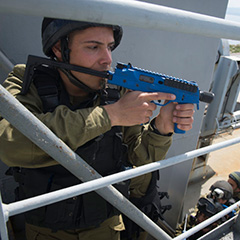 By Eugene Kogan, Tbilisi-based defence and security expert
By Eugene Kogan, Tbilisi-based defence and security expert
The trilateral military cooperation, begun in November 2017, has all the necessary components to become decisive for the three countries in the eastern Mediterranean in the long-term. In addition, the US is fully behind the three countries, sending a clear signal to Ankara not to provoke conflict in the region.
Turkey, which is still a member of NATO, is not in a position to prevent Israel from cooperating with NATO, although such cooperation is a thorn in the side of Turkey. Although Cypriot military exercises with Israel upset Turkey, it cannot prevent the two countries from cooperating. That is why we see a new military architecture in the Eastern Mediterranean, which will shape the security relations of the three countries in the coming years. READ MORE
President Trump’s Middle East Peace Plan: Possible Implications for Armenia  By Benyamin Poghosyan, PhD, Chairman, Center for Political and Economic Strategic Studies By Benyamin Poghosyan, PhD, Chairman, Center for Political and Economic Strategic Studies
On January 28, 2020 President Trump unveiled his much long waited peace plan for the Israeli – Palestinian conflict. The plan was warmly welcomed by the Israeli Prime Minister Benyamin Netanyahu and Israeli opposition leader General Gantz. Simultaneously, it was sharply criticized by the Palestinian leader Mahmoud Abbas, who told that it belonged to the dustbin of history, and by Hamas leaders who stated that Palestinians would confront that deal. Turkish President Erdogan called it a plan to ignore the rights of Palestinians and legitimize Israel’s occupation. READ MORE
- February 17, 2020 23:16PM
Madrid Principles and Elements Need New Update  By Benyamin Poghosyan, Chairman, Center for Political and Economic Strategic Studies, Yerevan By Benyamin Poghosyan, Chairman, Center for Political and Economic Strategic Studies, Yerevan
Since the start of the negotiations for the peaceful settlement of the Karabakh conflict all options suggested by the mediators have envisaged the return of some territories under the control of Nagorno-Karabakh to Azerbaijan. Meanwhile, till now, Armenia and Nagorno-Karabakh have managed to avoid such a scenario. However, this didn’t always happen for reasons under Armenian leaders’ control. READ MORE
Gulf Tensions May Spill Over into the Caucasus  By Benyamin Poghosyan, PhD, Executive Director, Political Science Association of Armenia By Benyamin Poghosyan, PhD, Executive Director, Political Science Association of Armenia
The September 14th attacks against Saudi Arabia's oil facilities have dangerously increased tensions in the Middle East. Regardless of the author of these actions - the Houthi rebels from Yemen or the Islamic Revolutionary Guard Corps using Iraqi or Iranian territories - a clear message was sent to the Gulf monarchies and the US: Iran on its own or through its proxy forces is capable of inflicting serious damage to the Gulf States’ vital interests, and the "maximum economic pressure" campaign led by the US since May 2018 has as yet failed to change Iranian regional policy. READ MORE
‘Game of Thrones Moment' for Azerbaijan in Nagorno-Karabakh 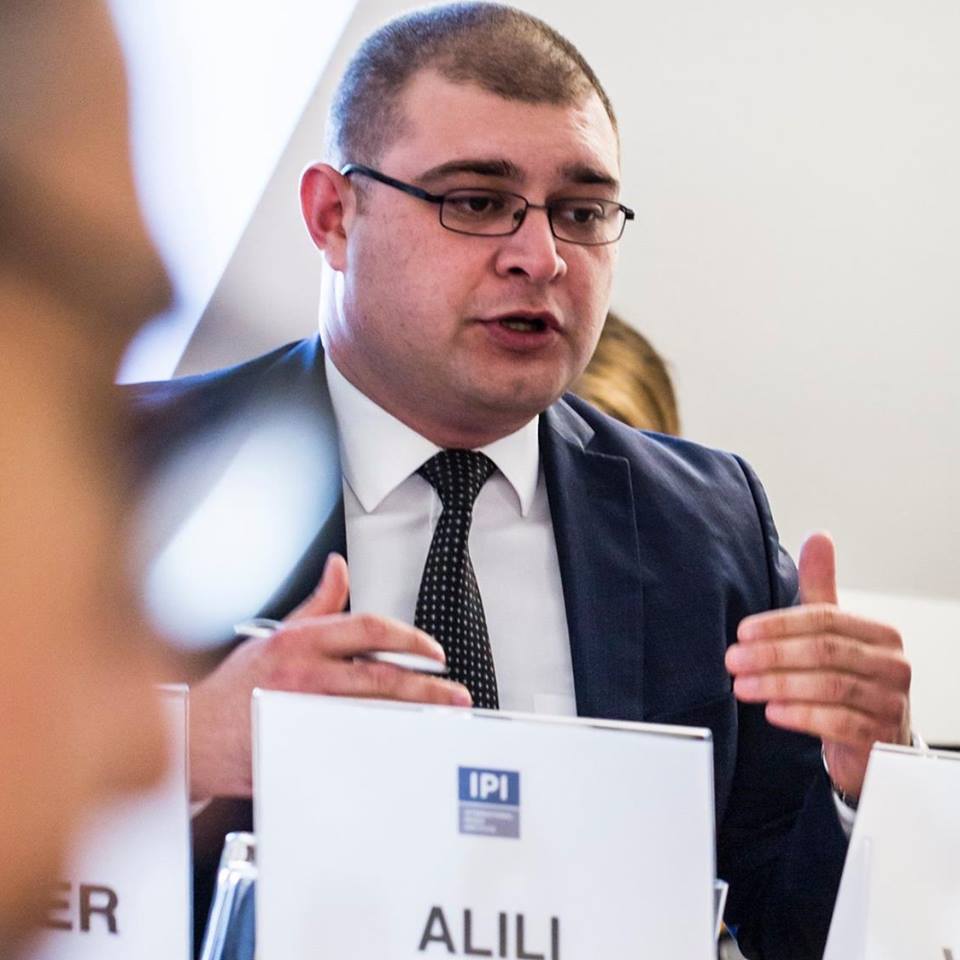 By Ahmad Alili, Head of Research, Caucasus Policy Analysis Center, Baku
By Ahmad Alili, Head of Research, Caucasus Policy Analysis Center, Baku
In the real world, we do not have dragons, faceless men, red woman, white walkers or resurrection from the dead. Yet, the public policy challenges facing advisers in the famous Game of Thrones (GoT) TV show mirror those that political advisors to real governments face. We draw parallels to the real world in the way the show's decision-makers and advisers face the same limitations of time, resources and information bias. READ MORE
- September 24, 2019 21:39PM
Is Russia Cultivating ‘Symmetric Separatism’ in Karabakh?  By Eduard Abrahamyan, Wider Black Sea & Central Asia regional security analyst By Eduard Abrahamyan, Wider Black Sea & Central Asia regional security analyst
Moscow’s mistrust of the Armenian government headed by Prime Minister Nikol Pashinyan dates all the way back to his rise to power last year in the so-called “Velvet Revolution.” And that mistrust has persisted despite Pashinyan’s various foreign policy gambits designed to win Russia’s confidence (see EDM, March 21). At the same time, Pashinyan’s domestic agenda—specifically, his determination to dismantle the previous regime’s oligarchic/kleptocratic order, including by prosecuting former president Robert Kocharyan for abuses of power—seems to be increasingly irking Moscow as well. READ MORE
- September 16, 2019 21:43PM
NATO and Georgian–American Military Relations 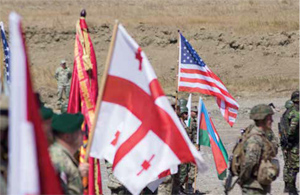 By Eugene Kogan, Tbilisi-based defence and security expert By Eugene Kogan, Tbilisi-based defence and security expert
Since the 2003 Rose Revolution, Georgia has become a staunch and dependable non-NATO ally of the United States in the South Caucasus. Georgian-American bilateral military relations have become stronger and have climaxed in November 2017. With 870 soldiers per capita, Georgia is the leading donor of troops in Afghanistan. This is highly appreciated by the United States. READ MORE
- September 9, 2019 22:26PM
Armenian-Azerbaijani Talks on Karabakh Appear Positive Even as Conflict Continues to Simmer Underneath  By Eduard Abrahamyan, Wider Black Sea & Central Asia regional security analyst By Eduard Abrahamyan, Wider Black Sea & Central Asia regional security analyst
The foreign ministers of Armenia and Azerbaijan held four-hour-long consultations in Paris, on January 16, under the auspices of the Organization for Security and Cooperation in Europe’s (OSCE) Minsk Group. The joint statement to come out of the meeting included telling language. In particular, the two sides acknowledged the need for “concrete measures to prepare the populations for peace”. READ MORE
Non-alignment Policy as a Principle of Shaping the National Security of Azerbaijan  By professor Sadi Sadiyev Saleh, War College of the Armed Forces, Republic of Azerbaijan By professor Sadi Sadiyev Saleh, War College of the Armed Forces, Republic of Azerbaijan
The emergence of a bipolar world and the formation of two military blocks (NATO and the Warsaw Pact) after the Second World War ushered in an intense rivalry between different countries. Finding an effective grand strategy to survive between two hostile powers inevitably requires a balanced policy. In this context, the underdeveloped countries felt the need to join efforts for the common defence of their interests, to strengthen their independence and sovereignty and to express a strong commitment for peace by declaring themselves as “non-aligned” from either of the two nascent military blocks. READ MORE
- February 14, 2019 20:25PM
The Realities Against Armenia’s "Nagorno-Karabakh Strategy of Pre-emption"  By professor Sadi Sadiyev Saleh, War College of the Armed Forces, Republic of Azerbaijan By professor Sadi Sadiyev Saleh, War College of the Armed Forces, Republic of Azerbaijan
An Armenian author, Benyamin Poghosyan, blamed Azerbaijan for lingering Nagorno-Karabach conflict in his recently published paper on “Armenia’s Karabakh Strategy, from Status Quo to Pre-emption”. It is abundantly clear that he hadn’t referred to any legal or reliable documents when he developed that paper. In order to come to grips with this issue we should hark back to the origin of the conflict. We will be focusing on three stages to let you digest the whole information: Where did this issue emanate from? What is the current situation? What are the prospects of future detente? READ MORE
- December 11, 2018 06:39AM
The Regional Security Situation Remains Challenging in the South Caucasus
 By Benyamin Poghosyan, PhD, Executive Director, Political Science Association of Armenia By Benyamin Poghosyan, PhD, Executive Director, Political Science Association of Armenia
The South Caucasus is facing multiple security challenges with no clear path to overcome them in the foreseeable future. The conflicts in Nagorno-Karabakh, Abkhazia and South Ossetia are hampering any efforts to have an inclusive regional cooperation, and are the key reasons for the strained Russia - Georgia relations and absence of relations between Armenia, Turkey and Azerbaijan. Meanwhile, there are no immediately apparent ways to move towards the settlement of these conflicts. Russia deployed military bases in both Abkhazia and South Ossetia, and demanded from Georgia to accept the geopolitical facts on the ground. READ MORE
Expect No Changes on the Karabakh Issue in the Next Year or Two  By Benyamin Poghosyan, PhD, Executive Director, Political Science Association of Armenia By Benyamin Poghosyan, PhD, Executive Director, Political Science Association of Armenia
On April 11, the incumbent President of Azerbaijan lham Aliyev was re-elected for his fourth term in office. Despite a boycott by the Azerbaijani opposition, as well as a tough assessment on elections from western observers, very few doubt that Aliyev will continue to rule in Azerbaijan. On April 9, Armenia finalized its transformation from semi-presidential system of government to a parliamentary one. The Parliament elected a new President - former Armenian ambassador in the UK Armen Sarkissian. His role defined by the new constitution is purely ceremonial. READ MORE
Russian-Turkish Relations and their Impact on NATO and the EU 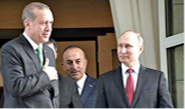 By Eugene Kogan, Tbilisi-based defence and security expert By Eugene Kogan, Tbilisi-based defence and security expert
The Black Sea region is one of the regions in which Turkey has lost its influence to Russia. NATO and the EU have no influence on relations between Russia and Turkey, as NATO has no mechanism for excluding Turkey as a member state, while the EU, although it has implicitly suspended negotiations on Turkey's possible membership, it is not prepared to make a clear statement that Turkey will not join the Union in the foreseeable future. READ MORE
Iran and the US are slowly heading towards collision  By Benyamin Poghosyan, PhD, Executive Director, Political Science Association of Armenia By Benyamin Poghosyan, PhD, Executive Director, Political Science Association of Armenia
US attempts to change the provisions of the nuclear deal with Iran will intensify over the next months, but things are only likely to come to a head in 2019.
Since the election of President Trump, US-Iran relations have deteriorated significantly. The new US administration has ratcheted up pressure against Tehran threatening to withdraw from the 2015 nuclear deal, also known as JCPOA. The key members of President Trump national security team have accused Iran of supporting terrorism, sowing chaos in the Middle East, and creating a vast network of non-state actors vehemently countering US interests in the region. READ MORE
Armenia, the Turkish Threat, and the Russian Antidote  By Benyamin Poghosyan, PhD, Executive Director, Political Science Association of Armenia By Benyamin Poghosyan, PhD, Executive Director, Political Science Association of Armenia
The Afrin events are being used to assert the notion that without Russian military guarantees, and a Russian military base deployed in Armenia, Yerevan will be under a constant threat from a potential Turkish offensive.
Turkey's military operation in Afrin proved once more that in the current geopolitical situation in the Middle East nothing can be excluded. Obviously, Turkey had made its own calculations when it launched the offensive, and the muted reaction of the main players of the region can be perceived as a proof that some preliminary discussions had taken place before the start of the operation. The nonlinear relations between powers involved in the Middle East makes it really complicated to understand what lies beneath the surface in terms of motives and assessments. READ MORE
- February 10, 2018 07:51AM
Kurdish region in turmoil  By Benyamin Poghosyan, PhD, Executive Director, Political Science Association of Armenia By Benyamin Poghosyan, PhD, Executive Director, Political Science Association of Armenia
There is uncertainty in Iraq's Kurdish Region after President Barzani's independence gamble misfires.
On September 25, 2017 Iraq's Kurdistan Regional Government (KRG) held an independence referendum with the overwhelming majority voting in favour of independence. The referendum was organized despite strong opposition from neighbouring Turkey and Iran, as well as Iraq's central Government, which called it illegal. Iraqi Kurdistan's decision to hold the referendum also in disputed territories, including the oil rich city of Kirkuk that have been under Kurdish control after the Iraqi army abandoned those territories as a result of ISIS advancements, caused further irritation in Baghdad. READ MORE
The New End Game (Part 1)  By Mehmood-Ul-Hassan Khan, EGF Affiliated Expert
By Mehmood-Ul-Hassan Khan, EGF Affiliated Expert
The new “end game” has been started by the national, regional and international power brokers. Shahid Khaqan Abbasi, who has been sworn in as the new Prime Minister of Pakistan, has already announced his priorities. He said there would be no load-shedding after November this year, and he pointed out that ten thousands megawatts of additional electricity will be added to the national grid. The completion of the ongoing mega-projects of energy in different parts of Pakistan would also be one of his national priorities. READ MORE
“Towards Europe?! Straddling Fault Lines and Choosing Sides in the South Caucasus” 10th Workshop of the PfP Consortium’s “Regional Stability in the South Caucasus” Study Group (RSSC SG)
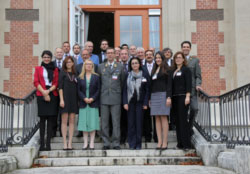 On 6-8 November, 2014, the PfPC and the Austrian National Defense Academy jointly organized the 10th Workshop of the RSSC SG at “Schloss Rothschild” in Reichenau (Austria). This workshop offered a platform for constructive dialogue among government and academic experts on the prospective roles of the EU and the Eurasian Economic Union (EEU) in breaking the current deadlocks in the resolution of the protracted conflicts in Abkhazia, South Ossetia and Nagorno-Karabakh. During this workshop, a panel moderated by George Niculescu, the Head of Research of EGF, examined the background and the potential implications from the perspectives of South Caucasus (SC) states of having to make undesirable choices between the EU and the EEU. The panelists’ presentations and the ensuing discussion highlighted that, against the backdrop of the Ukrainian crisis, maintaining freedom of choice on the ways and levels of engagement with both the EU and the EEU is a critical interest for each SC state, and a prerequisite for effective conflict resolution. In this context, Mr Niculescu thought that “the EU might work towards developing options for harmonizing the European and Eurasian integration normative systems. One of the options to be explored might involve sustaining post-conflict regional economic cooperation as a way to circumvent the dilemma of the states caught in-between competing European and Eurasian integration processes.” READ MORE. Please see the relevant post on Facebook here. On 6-8 November, 2014, the PfPC and the Austrian National Defense Academy jointly organized the 10th Workshop of the RSSC SG at “Schloss Rothschild” in Reichenau (Austria). This workshop offered a platform for constructive dialogue among government and academic experts on the prospective roles of the EU and the Eurasian Economic Union (EEU) in breaking the current deadlocks in the resolution of the protracted conflicts in Abkhazia, South Ossetia and Nagorno-Karabakh. During this workshop, a panel moderated by George Niculescu, the Head of Research of EGF, examined the background and the potential implications from the perspectives of South Caucasus (SC) states of having to make undesirable choices between the EU and the EEU. The panelists’ presentations and the ensuing discussion highlighted that, against the backdrop of the Ukrainian crisis, maintaining freedom of choice on the ways and levels of engagement with both the EU and the EEU is a critical interest for each SC state, and a prerequisite for effective conflict resolution. In this context, Mr Niculescu thought that “the EU might work towards developing options for harmonizing the European and Eurasian integration normative systems. One of the options to be explored might involve sustaining post-conflict regional economic cooperation as a way to circumvent the dilemma of the states caught in-between competing European and Eurasian integration processes.” READ MORE. Please see the relevant post on Facebook here.
- February 20, 2015 18:32PM
Whither the Euro-Atlantic security?  By George Niculescu, By George Niculescu,
Director of Programs, Centre for East European and Asian Studies Bucharest,
Affiliated Expert, European Geopolitical Forum Brussels
Historically, the roots of the phrase "Euro-Atlantic security" stem from the revolutionary shift towards cooperative relations between NATO and its former adversaries from the Warsaw Treaty Organization promoted through the North Atlantic Cooperation Council and the Partnership for Peace (PfP). From an institutional point of view, since 1997, the Euro- Atlantic security is tightly linked with the Euro-Atlantic Partnership Council (EAPC) which has been created jointly by the NATO members and PfP countries (including Russia, Ukraine, and the other independent republics emerging from the dissolution of the former Soviet Union) as a forum enabling an "expanded political dimension of partnership and practical cooperation under the PfP" [Basic Document of the EAPC]. The EAPC was meant to complement the respective activities of the OSCE, the European Union, and the Council of Europe. READ MORE
The Security of the South Caucasus States and NATO With the support of the Public Diplomacy Division of NATO Headquarters (Brussels) the Region Research Center (Armenia) has started the implementa- tion of the project " The Security of the South Caucasus and NATO" (December 2011 - March 2012). READ MORE
- February 28, 2012 04:08AM
Security deficit and possibilities to overcoming contemporary situation In the Southern Caucasus Region 
Prof. Alla A.Yazkova,
Institute of Europe RAS, Moscow
Over the two decades that passed after the USSR disintegration the previously rather calm and in a way peripheral South Caucasus region has become a crossroad of internal contradictions and geopolitical competition. In the subsequent years this relatively small area was gradually turned into a hotbed of numerous conflicts involving not only Southern Caucasus countries but also European and global actors. Interference from the late 1990-s of world powers, first of all the United States and European Union, substantially aggravated situation. The US interest not only in creation of an energy transportation route, but also in barring Russian monopoly domination entailed growth of contradictions that in one or another way involved regional powers – Turkey and in the recent times Iran. READ MORE
Algeria: The Risks of slipping into deeper political crisis By Eugen Iladi, Independent Expert
The dramatic events in Tunisia and Egypt, where long-serving presidents have been ousted within weeks of each other by “street-led people’s revolts”, are inspiring demonstrators in other Muslim countries to demand structural political change. Libya is currently gripped by deep political crisis, as is the tiny Gulf Monarchy of Bahrain, whilst revolts are ongoing in Yemen, Morocco and Iran. Furthermore, Algeria seems to be one of the next countries possibly hanging in the balance, where the prospect of regime change must now be a question of serious concern. READ MORE
|
|
